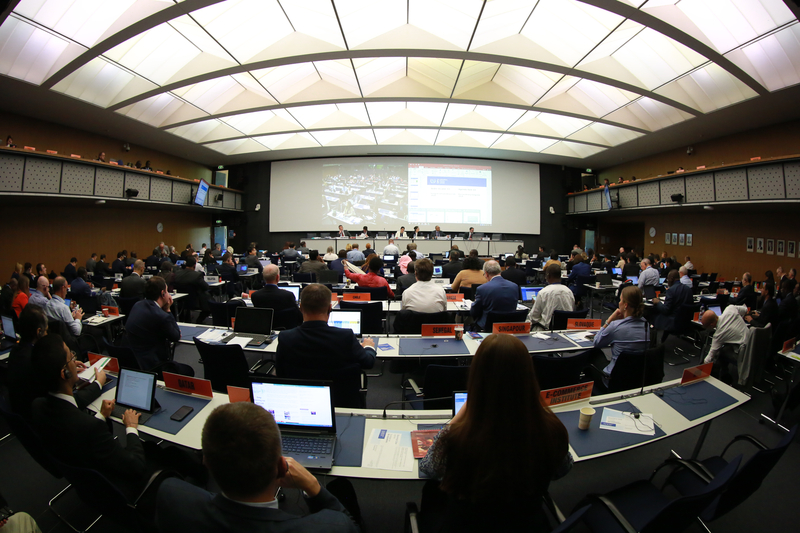UPU remuneration systems
 The payments that the receiving designated operator can collect from the sending designated operator are known as terminal dues in the case of letter-post items (a category which covers small packets containing goods as well as traditional letters), and inward land rates for parcels. The provisions governing the UPU remuneration systems are laid down in the UPU Acts. Additionally, the UPU provides for transit charges for mail exchanged between designated operators through a third country. Transit charges are paid by the designated operator of the origin country to the designated operator of the intermediary country for its forwarding of mail to the destination country.
The payments that the receiving designated operator can collect from the sending designated operator are known as terminal dues in the case of letter-post items (a category which covers small packets containing goods as well as traditional letters), and inward land rates for parcels. The provisions governing the UPU remuneration systems are laid down in the UPU Acts. Additionally, the UPU provides for transit charges for mail exchanged between designated operators through a third country. Transit charges are paid by the designated operator of the origin country to the designated operator of the intermediary country for its forwarding of mail to the destination country.
For the most part, settlements of terminal dues, inward land rates and transit charges are based on statistics on the mail exchanged between the designated operators of the sending and destination countries specific to the weight and item data of each respective flow.
History
Terminal dues
Based on the assumption that each letter demands a response, in 1874, the founders of the Union reasoned that the number of letters received by a postal operator would more or less equal the number of letters sent, meaning that it was unnecessary to remunerate the destination operator for the services rendered.
By 1964, a growing number of countries were challenging this principle of reciprocity and calling for a change in the system, because they received far more international mail than they dispatched, and argued that they should be compensated for the increased handling costs. Adopted by the 1969 Congress in Tokyo, the system of terminal dues came into being in July 1971, with the sending country paying the receiving country for handling and delivering the excess of international surface mail.
In the early years, an important deficit of the system, with its uniform weight-based remuneration, was the misalignment between the global terminal dues rates and the actual costs for handling, transporting and delivering letter-post items, which could vary significantly between countries.
Ever since the 1969 Congress, there have been many efforts to find an equitable formula which takes account of all the factors and complexities involved in remunerating international postal exchanges. As a result, the terminal dues system has become increasingly geared towards costs, as a growing number of mail flows between UPU member countries were subject to country-specific rates for which domestic tariffs were used as a proxy for the costs of delivery. The system has also come to take account of political and economic principles, as well as recognizing the varying levels of economic development of different countries.
Recent Congresses have introduced important quality-oriented aspects into the terminal dues system, with rate increases made contingent on quality of service improvements and electronic data exchanges that drive improved customer and operational visibility of mail items moving through the network.
In terms of capacity-building, an important aspect of the terminal dues system is the Quality of Service Fund (QSF), aimed at improving the quality of inbound letter-mail flows, making national postal services and international mail flows more speedy, reliable and secure. The Fund was created by the 1999 Beijing Congress and its activities commenced in 2001, financed through an increase in the rate of terminal dues applied to mail from industrialized countries to developing countries.
Over the past decade, consumers’ buying habits have undergone a sea change. People have grown increasingly comfortable making online purchases from retailers located in another country. UPU member countries responded to the challenges of declining mail volumes and the growth opportunities in the e-commerce segment by adopting a reform agenda to modernize, integrate and rationalize the UPU remuneration systems through the Integrated Remuneration Plan (IRP) adopted by the second Extraordinary Congress in Addis Ababa in 2018.
Towards the end of 2018, in response to cost-coverage and market distortion concerns raised by several countries, the members of the Council of Administration decided to fast-track the implementation of the IRP so that, within less than one year, member countries gathering for a third Extraordinary Congress in Geneva in September 2019 were able to agree on a new remuneration system for bulky letters and small packet letter-post items. The third Extraordinary Congress is testimony to successful multilateral cooperation, as the Union was kept intact and adopted, by acclamation, important reform goals at least two years ahead of what was already considered an ambitious IRP roadmap schedule.
Over the course of 50 years, the terminal dues system has undergone profound change, as the remuneration system has constantly been reviewed and updated in line with market conditions and other important principles, such as the need to ensure cost coverage and non-discriminatory access by the world's citizens to an affordable universal postal service.
In recognition of the increasingly important role that the postal channel plays in facilitating international trade, particularly e-commerce, there is no doubt that new questions will emerge in the next 50 years on how the UPU member countries will fulfil the mandate to ensure universal access to affordable international postal services in an increasingly competitive cross-border delivery market.
Inward land rates
 Originally, inward and outward land rates were laid down in the Postal Parcels Agreement, as a separate agreement from the Convention. Not all UPU member countries were signatory to that agreement. Under the inward land rate (ILR) system, designated operators had access to the delivery of their parcels in the destination country on the basis of a payment of a single weight-based charge, uniformly applicable throughout the territory of the country of destination. Among other things, that solution had the advantage of simplifying accounts between countries.
Originally, inward and outward land rates were laid down in the Postal Parcels Agreement, as a separate agreement from the Convention. Not all UPU member countries were signatory to that agreement. Under the inward land rate (ILR) system, designated operators had access to the delivery of their parcels in the destination country on the basis of a payment of a single weight-based charge, uniformly applicable throughout the territory of the country of destination. Among other things, that solution had the advantage of simplifying accounts between countries.
Outward and inward rates were guideline rates defined by weight step, although the agreement allowed designated operators to increase those rates and apply special rates for air parcels. The agreement provided designated operators with the option of increasing their inward land rates up to the amount of their costs, provided that they did not exceed their outward land rates. Most operators exercised these options and made reservations in the Final Protocol, authorizing them to collect rates in excess of those specified in the agreement and enabling them to set their inward land rates at a higher level than the outward ones.
Designated operators were completely free to set an inward land rate that would allow those costs to be covered in their entirety. In that context, it was naturally important to take account of the competitive situation on the postal parcels market and of the need to control costs.
To address these concerns, the 1994 Seoul Congress revised the system of inward land rates for parcels so as to better reflect actual costs. It based the calculation of inward land rates on a universal rate which combined a rate per parcel (to take account of fixed costs) with a rate per kilogramme of gross weight of mail (to reflect variable costs), replacing the weight steps previously used. The rates of 2.85 SDR per item and 0.28 SDR per kilogramme were for guidance only and had been set before the domestic rate had been abolished. Although the rates were only indicative, with each country free to amend them as provided for in the agreement, the changes established a remuneration system that was based on a per-item and per-kilogramme rate.
The concept of outward land rates was eliminated by the 1994 Seoul Congress, as it was seen to be ineffective and generally misunderstood.
Further changes were adopted by the 2004 Bucharest Congress, which introduced a new methodology for the inward land rate system which is currently still in place. As a result of the Bucharest decisions, since 2006, the ILR remuneration system has consisted of two components: a base rate component and a bonus component. The latter provides designated operators (DOs) with an incentive for improving their parcel processing and delivery procedures.
Under the current rate system, the inward land base rate is set at 71.4% of each DO's ILR for 2004, and is composed of a per-item and a per-kilogramme rate. DOs are also eligible for bonus payments worth up to an additional 40% (of the base rate) based on the provision of service features, in particular if they ensure timely exchange of electronic tracking information and a rapid response to customer inquiries about their international parcels. Significant improvements have been made to the international parcels service over the last 10 years. In part, this is due to the incentives for service improvement offered by the bonus system.
In addition, DOs can request adjustments to their inward land rates on the basis of inflation variation recorded in their country's consumer price index.
The ECOMPRO parcel is an optional service introduced in 2015, based on self-declared rates and without a pay-for-performance system.
UPU bodies
 Both the Council of Administration (CA) and the Postal Operations Council (POC) are responsible for the governance, development and integration, and implementation of the UPU remuneration systems. The POC leads the operational and financial side of the process, while the CA oversees the governance and regulatory aspects.
Both the Council of Administration (CA) and the Postal Operations Council (POC) are responsible for the governance, development and integration, and implementation of the UPU remuneration systems. The POC leads the operational and financial side of the process, while the CA oversees the governance and regulatory aspects.
Remuneration systems are reviewed regularly during the four-yearly Universal Postal Congress, an occasion where all 192 UPU members come together to make decisions affecting the global postal sector. On more operational issues, as well as the “day-to-day” matters concerning the implementation of the Congress decisions, this review takes place during the sessions of the two councils, and especially the POC.
Between Congresses, the POC and CA work hand in hand to study possible changes to the remuneration systems, which ultimately lead to the submission of carefully negotiated proposals to the Congress for a decision by the UPU member countries.